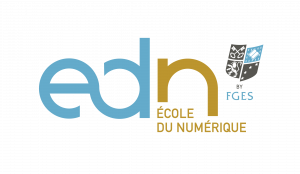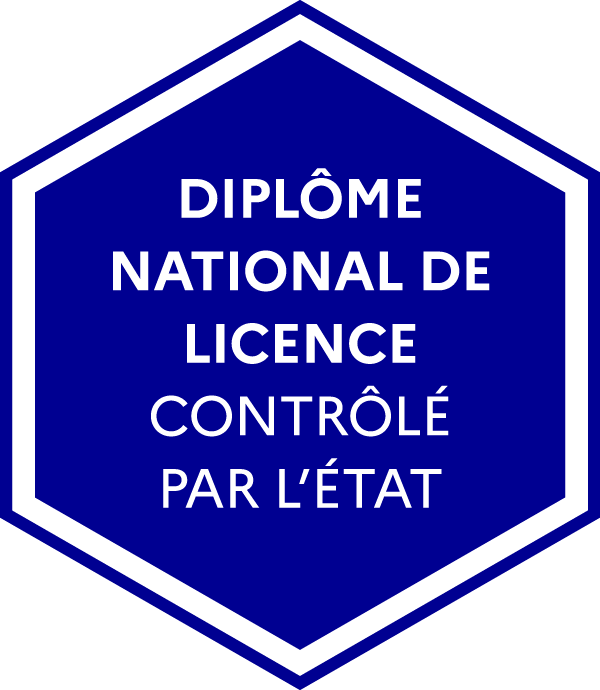Bachelor in Management & Digital
Diplôme national en convention avec l’Université Polytechnique Hauts-de-France
Licence Droit, Économie, Gestion / Mention Gestion

FOR WHOM ?
For admission to the first year of undergraduate studies (Licence 1):
High school students preparing for a general baccalaureate. Specialization in ‘Mathematics’ in the first year strongly recommended – specialization in ‘SES’ (Social and Economic Sciences) recommended in both first and final year. »
Why choose this bachelor ?
- Understand and support the impacts of digital transformation within companies
- Develop practices with a sustainable and ethical approach
- Manage people, develop products and manage companies in the digital age
- Retain a wide choice of possible directions after the degree
ADVANTAGES
- A hybrid « management & digital » training that provides a dual skill set.
- Innovative pedagogical methods and tools, along with soft skills development.
- Possibility of an apprenticeship program in the third year (L3).
- Optional paths to customize one’s curriculum.
Le programme
Licence 1
| Semestre 1 | |
| Enseignements fondamentaux | 24 crédits |
| Comptabilité financière | 4 |
| Introduction à la gestion d’entreprise | 2 |
| Introduction au management | 2 |
| Bureautique de gestion (Excel) | 2 |
| Statistique descriptive | 2 |
| Bases de données | 2 |
| Culture générale du numérique | 2 |
| Introduction au droit | 2 |
| Analyse et politique de l’économie du numérique | 2 |
| Soft skills | 2 |
| Anglais | 2 |
| Parcours optionnel (voir ci-dessous) | 6 crédits |
| Semestre 2 | |
| Enseignements fondamentaux | 26 crédits |
| Comptabilité financière | 4 |
| Analyse et théories des organisations | 4 |
| Bureautique de gestion | 4 |
| Analyse et politiques économiques | 4 |
| Connaissance de l’entreprise du numérique | 2 |
| Système de gestion de contenu des sites web | 2 |
| Droit des contrats | 2 |
| Soft skills | 2 |
| Anglais | 2 |
| Parcours optionnel (voir ci-dessous) | 4 crédits |
Licence 2
| Semestre 3 | |
| Enseignements fondamentaux | 26 crédits |
| Marketing opérationnel | 5 |
| Management des ressources humaines | 4 |
| Comptabilité de gestion | 4 |
| Veille informationnelle, méthodes et outils | 2 |
| Connaître et choisir les outils de business intelligence | 2 |
| Gestion de projet | 1 |
| Introduction à l’économie et au commerce international | 2 |
| Soft skills | 2 |
| Anglais | 2 |
| 1ère année de stage (rapport) et professionnalisation | 2 |
| Parcours optionnel (voir ci-dessous) | 4 crédits |
| Semestre 4 | |
| Enseignements fondamentaux | 26 crédits |
| Gestion budgétaire | 3 |
| Data Marketing | 4 |
| Introduction au progiciel de gestion intégré | 3 |
| Soft skills | 3 |
| Probabilités / statistiques | 4 |
| Droit de la concurrence & de la distribution | 3 |
| Projet d’initiative | 4 |
| Anglais | 2 |
| Parcours optionnel (voir ci-dessous) | 4 crédits |
Licence 3
| Semestre 5 | |
| Enseignements fondamentaux | 26 crédits |
| Marketing et stratégie digitale | 3 |
| Fondamentaux de la stratégie d’entreprise | 4 |
| Economie du numérique | 3 |
| Développement durable et RSE | 3 |
| Fiscalité | 4 |
| Droit du numérique | 2 |
| 2ème année de stage (rapport) et professionnalisation | 2 |
| Soft skills | 3 |
| Anglais | 2 |
| Parcours optionnel (voir ci-dessous) ou période en entreprise (alternance) | 4 crédits |
Programme en cours de finalisation pour une ouverture en 2023 :
| Semestre 6 | |
| Enseignements fondamentaux | |
| Analyse et diagnostique financier | – |
| Les enjeux de la cybersécurité | – |
| Jeu d’entreprise | – |
| Initiation à la programmation | – |
| Droit du travail | – |
| Soft skills | – |
| Anglais | – |
| Parcours optionnel (voir ci-dessous) ou période en entreprise (alternance) | – |
Optionnal courses
1 – The cultural openness course
To be chosen at the start of the academic year
- Each year, the student chooses subjects allowing them to broaden their knowledge in various fields.
- Develop curiosity, openness to others, to ideas and to differences (« openness to the world »)
- Develop an « artistic » sense
- Acquire skills that are useful from a professional point of view (« business support »)
- Learn a second language
Course Materials
2 subjects per semester to be chosen in the different areas
- Languages: German, Spanish, Chinese
- Openness to the world: geography of globalisation, music and philosophy, etc.
- Creativity/Sport: theatre, improvisation, photography, etc.
- Business support: IT, consumer sociology, business ethics, etc
2 – The entrepreneurship course
To be chosen at the start of the academic year
- The student has a business creation project and joins the Pépite France programme, the leading network of student-entrepreneurs, subject to validation by the Commission.
- They benefit from time dedicated to the development of their project (4 afternoons per week) and they are supported by the HubHouse, the University’s incubator-accelerator.
- Each year is validated by 3 panel sittings: in November for semester 1 (4 credits), in February and May for semester 2 (4 credits).
- The student is made aware of environmental and societal issues and reflects on the creation of a start up.
- The « Positive Impact » Start-up course was created to provide resources and tools that make it possible to create a project in response to local problems in the region.
- The different steps:
- year 1: emergence of the project (development of the idea, market study and validation of the problem, development of a project plan)
- year 2: feasibility study of the project (business model, communication and operation in network mode, development of the prototype)
- year 3: implementation (experimentation phase, support with coaches, participation in the FGES Start-up regional competition with positive impact)
Course Materials
In bachelor 1 :
- Creativity, design thinking and project management (semester 1)
- Economic aspects of sustainable development (semester 1)
- Introduction to Organisational Behaviour (semester 2)
- Social business (semester 2)
3 – Le parcours pépite
A choisir à la rentrée universitaire
Les étudiants qui souhaitent intégrer le parcours Pépite sont des étudiants porteurs de projets. Ils ont l’ambition de créer une activité. Ils peuvent candidater au dispositif Pépite qui est un statut national. Ils passeront alors devant une commission.
Ce statut favorise la mise en relation des projets de création d’entreprise des étudiants et jeunes diplômés avec les entreprises ainsi que les structures d’accompagnement et de financement. Ce statut permet aussi de construire et développer son projet entrepreneurial dans le cadre de son cursus universitaire, au sein de son établissement, en plus de bénéficier d’un accompagnement.
Stages en L1 & L2, alternance en L3
Licence 1 :
Stage ou CDD, mission d’exécution de 4 semaines minimum
Licence 2 :
Stage ou CDD, mission de technicien de 4 semaines minimum
Licence 3 :
Stage ou CDD, mission en lien avec la poursuite d’études de 6 semaines minimum
ou alternance : 3 jours par semaine en entreprise sur l’ensemble de l’année universitaire.
SUCCESS RATE
And After ?
Opportunities for further studies in a wide range of fields:
- Master’s in Business Management.
- Specialized Master’s programs in various areas of business: Human Resources, Marketing, Digital Strategy, etc.
Les Masters proposés à la FGES :
PEDAGOGICAL COORDINATOR







